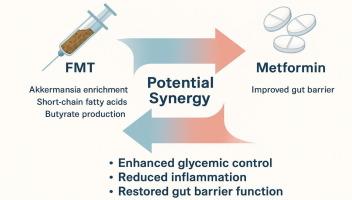The eternal struggle between titans: Fecal microbiota transplant (FMT) versus metformin in type 2 diabetes (T2D) gut dysmotility
IF 13
1区 综合性期刊
Q1 MULTIDISCIPLINARY SCIENCES
引用次数: 0
Abstract
Background
The prevalence of dysbiosis in type 2 diabetes (T2D) is increasing globally as a consequence of an imbalance in the distribution of gut microbial populations. Dysmotility of the gastrointestinal tract has emerged as a contributor to pathophysiology of T2D, where impaired motility may exacerbate dysbiosis and metabolic dysfunction.Current management of T2D, such as Metformin (Metf), demonstrate efficacy in improving metabolic parameters but are linked to gastrointestinal side effects, the mechanisms of which remain poorly understood.Novel promising therapeutic agents, based on the modulation of the gut microbiota has emerged for the treatment of metabolic disorders, particularly for T2D, in which Fecal microbiota transplant (FMT) assumes the major weight as strategy to improves insulin sensitivity and glucose tolerance, and potentially ameliorating gut motility. Although FMT represents a potential therapeutic alternative, its comparative effectiveness and safety profile relative to Metf in this specific setting remain to be established.Aim of the review
This review aims to evaluate and compare these two potent modulators of microbial landscape, Metf and FMT, in addressing insulin resistance (IR) and gastrointestinal dysmotility in T2D. The study seeks to systematically delineate the mechanisms underlying their effects and assess their therapeutic potential, safety, and clinical efficacy.Key scientific concepts of the review
The physiological roles of the gut microbiota and their metabolites are explored, highlighting their contribution to the onset and progression of metabolic disorders, particularly T2D. We examined the mechanisms through which Metf and FMT influence gut microbiota, insulin sensitivity, and glucose tolerance. Novel therapeutic approaches, including the combined use of Metf and FMT, are discussed in terms of molecular mechanisms, clinical outcomes, and safety profiles. Finally, the potential integration of these strategies into T2D management and their impact on gastrointestinal dysfunction are considered as areas for further research.

巨人之间永恒的斗争:粪便微生物群移植(FMT)与二甲双胍治疗2型糖尿病(T2D)肠道动力障碍
背景:由于肠道微生物群分布不平衡,全球2型糖尿病(T2D)中生态失调的患病率正在增加。胃肠道运动障碍已成为T2D病理生理学的一个因素,其中运动障碍可能加剧生态失调和代谢功能障碍。目前的T2D治疗,如二甲双胍(Metformin, Metf),显示出改善代谢参数的有效性,但与胃肠道副作用有关,其机制尚不清楚。基于肠道微生物群调节的新型有前景的治疗药物已经出现,用于治疗代谢性疾病,特别是T2D,其中粪便微生物群移植(FMT)作为改善胰岛素敏感性和葡萄糖耐量的主要策略,并可能改善肠道运动。虽然FMT代表了一种潜在的治疗选择,但在这种特定情况下,其相对于Metf的相对有效性和安全性仍有待确定。本综述旨在评价和比较两种有效的微生物景观调节剂Metf和FMT在解决t2dm中胰岛素抵抗(IR)和胃肠运动障碍中的作用。本研究旨在系统地描述其作用机制,并评估其治疗潜力、安全性和临床疗效。综述的关键科学概念探讨了肠道微生物群及其代谢物的生理作用,强调了它们对代谢性疾病,特别是T2D的发生和进展的贡献。我们研究了Metf和FMT影响肠道微生物群、胰岛素敏感性和葡萄糖耐量的机制。新的治疗方法,包括Metf和FMT的联合使用,在分子机制、临床结果和安全性方面进行了讨论。最后,将这些策略整合到T2D管理及其对胃肠功能障碍的影响被认为是进一步研究的领域。
本文章由计算机程序翻译,如有差异,请以英文原文为准。
求助全文
约1分钟内获得全文
求助全文
来源期刊

Journal of Advanced Research
Multidisciplinary-Multidisciplinary
CiteScore
21.60
自引率
0.90%
发文量
280
审稿时长
12 weeks
期刊介绍:
Journal of Advanced Research (J. Adv. Res.) is an applied/natural sciences, peer-reviewed journal that focuses on interdisciplinary research. The journal aims to contribute to applied research and knowledge worldwide through the publication of original and high-quality research articles in the fields of Medicine, Pharmaceutical Sciences, Dentistry, Physical Therapy, Veterinary Medicine, and Basic and Biological Sciences.
The following abstracting and indexing services cover the Journal of Advanced Research: PubMed/Medline, Essential Science Indicators, Web of Science, Scopus, PubMed Central, PubMed, Science Citation Index Expanded, Directory of Open Access Journals (DOAJ), and INSPEC.
 求助内容:
求助内容: 应助结果提醒方式:
应助结果提醒方式:


